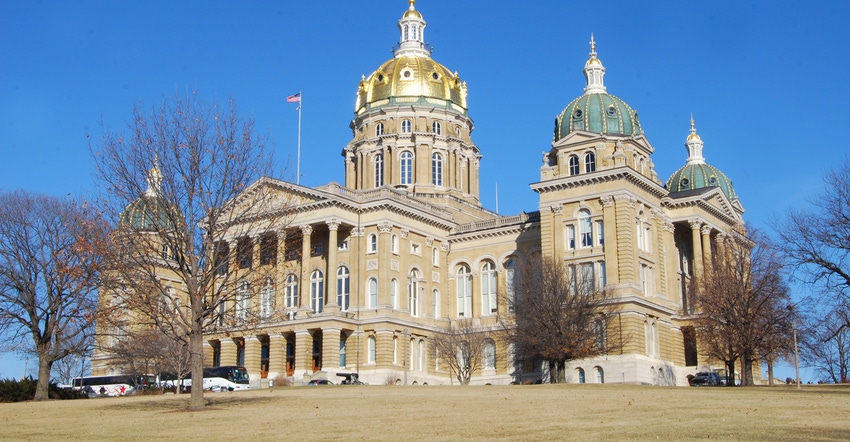July 27, 2018

Many laws passed during the 2018 Iowa legislative session that impact farmers and landowners. A number of these laws went into effect July 1. Some are specific to agriculture; others are more broadly reaching. Here are some highlights. For a more comprehensive listing and explanation, visit calt.iastate.edu/blogpost.
Ag laws
These laws are specific to agriculture:
Fence law revisions (HF 2340). This law requires fence viewers to disclose potential conflicts of interest and provides for disqualification based upon an actual conflict. If a fence viewer is disqualified, the law provides that the remaining township trustees will appoint a substitute. If the parties to a dispute sign a waiver, the fence viewer with the conflict may participate in the dispute resolution process.
The new law also allows fence viewers to determine, after a site evaluation, that a partition fence is “unfeasible.” This determination may be based upon any of the following considerations: topography, terrain, terraces, land slope, unstable ground, presence of surface water, drainage systems, sinkholes or water wells, easements, utilities and available area.
Once the fence viewers determine it is unfeasible to build a portion of a partition fence, they will seek to have the parties agree to an alternative. If this doesn’t occur within 60 days, the viewers will order the erection of the fence at the most “feasible location on the property of the owner who initiated the controversy that is closest to the adjoining owner’s property boundary."
Prohibiting discharge of pesticides into lake (HF 2407). This law prohibits a person from intentionally discharging a pesticide, off-label, into any lake connected to a water source. Violators will face a civil penalty of $1,000. The law doesn’t apply to certified applicators.
Changes to noxious weed law (HF 2422). This law grants the Iowa Department of Agriculture and Land Stewardship authority to declare new noxious weeds through rule rather than waiting for legislative action. This will allow for quicker responses to emerging threats. The law also allows the secretary of agriculture to name a state weed commissioner, instead of act as the state weed commissioner.
The law directs that IDALS may establish a list of priority noxious weeds and methods of control for state and local authorities, including the Department of Transportation. The law authorizes county boards of supervisors to adopt programs of weed control and directs the boards and the DOT to control or eradicate noxious weeds growing on roads within their jurisdictions.
The program also includes issuing permits for burning, mowing and spraying of roadsides by private individuals. Such activity must be consistent with adopted integrated roadside vegetation management plans.
The law eliminates the state botanist and increases the ability of county supervisors and the DOT to spray for control and eradication of noxious weeds. Prior law allowed for spraying only where it wasn’t practical to mow or otherwise control the weeds.
New law for installation of cattle guards (SF 449). Allows a landowner to install a cattle guard in certain cases where a fence is frequently impaired by flooding. The landowner will be liable to any injury to a person or vehicle caused by the cattle guard. The landowner must show proof of liability coverage each year. Cattle guards may be placed on Level B or C roads; speed in those areas will be limited to 15 miles per hour.
The cattle guard is allowed only where:
• The street or highway terminates in a dead end, and is completely or partially located in a flood plain.
• The road serves no residence, and exits to a secondary road.
• The landowner owns the property on both sides of the street or highway that terminates in a dead end.
• The effective purpose of restraining livestock using a fence along the street or highway is continually impaired by flooding or other natural forces.
• Flooding or other natural forces have and will, with a reasonable probability, continue to create liability for the landowner and risk of injury to the public from livestock straying onto the secondary road.
This new law became effective April 17. An amendment, HF 2502, passed May 5, provides that any cattle guard installed on or before April 25 that meets the requirements of SF 449 can’t be ordered uninstalled or found noncompliant through any action taken after April 25.
Property law
This new law reorganizes and replaces Iowa Code Chapter 651 and integrates many provisions from the Iowa Rules of Civil Procedure which governed partition actions:
New partition law for “heirs property” (SF 2175). This law creates a new partition procedure for “heirs property.” It also authorizes the equitable remedy of “owelty,” a payment of money allowed to equalize the value of property received in a partition in-kind action.
The new Iowa Code Chapter 651 means a tenant in common not wanting to sell the family farm will likely not be forced to do so. For many of these properties, a buyout or a partition in kind will now be the favored disposition if another co-tenant seeks a partition by sale.
Natural resources law
Two laws deal with natural resources:
IDNR given authority to set hunting, fishing and trapping fees (HF 631). This law grants the Iowa Department of Natural Resources authority to set hunting, fishing and fur harvesting license fees by rule. These fees will be periodically reviewed at least once every three years. Any fee increase would be subject to a one-year delay (with possible legislative review), and an individual license fee will not be increased in any calendar year by more than 5%.
Increases in wildlife fee habitat revenues could be used for fish habitat or game bird habitat purposes, but not land acquisition. The law also added a nonresident, five-day hunting license. This bill was signed into law May 17.
Water quality funding (SF 512). This new law provides $282 million over 12 years to fund edge-of-field and in-field infrastructure projects designed to meet Iowa Nutrient Reduction Strategy goals, as well as fund projects to improve the quality of Iowa’s surface water, groundwater and drinking water. On May 4, several technical corrections were made to the law through HF 2440.
The Legislature also passed new tax legislation that will impact many farmers. And changes were made in the law regarding health insurance, providing two new health care benefit options for small employers and sole proprietors.
Tidgren is an attorney and director of the Center for Ag Law and Taxation at ISU. Contact her at [email protected].
About the Author(s)
You May Also Like






